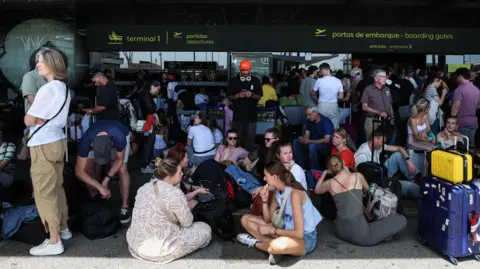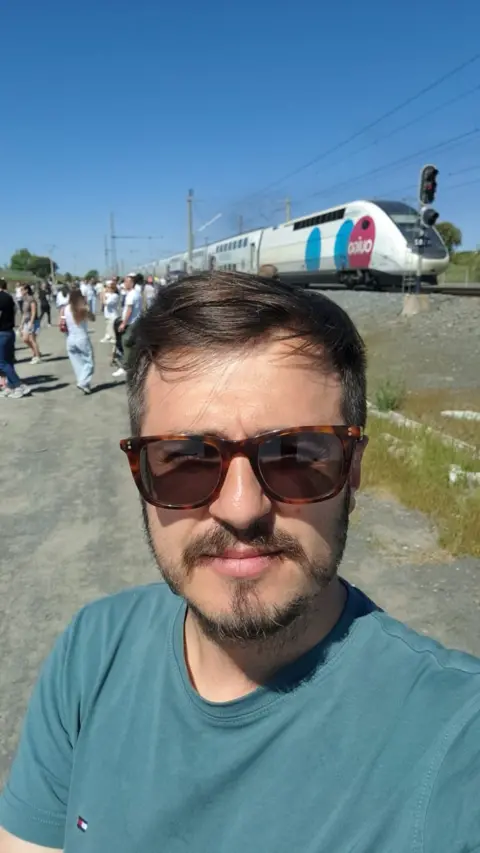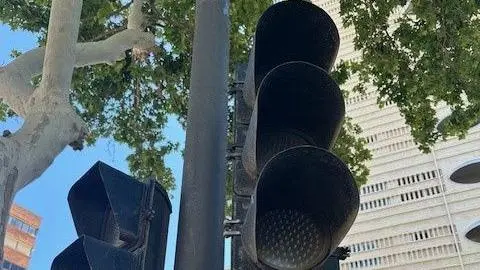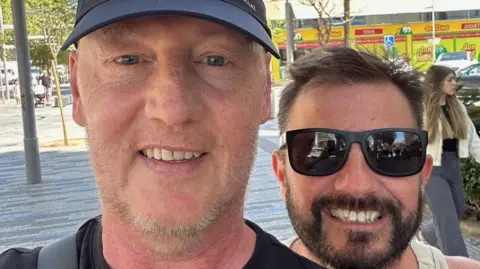‘Everything went off’: How Spain and Portugal’s massive power cut unfolded
31 minutes agoMallory MoenchBBC News

 EPA
EPAThe first sign of trouble Peter Hughes noticed was when his train to Madrid starting to slow down.
Then the TV monitor and lights went off. Emergency lights switched on, but did not last, and the locomotive ground to a halt.
Four hours later, Mr Hughes was still stuck on the train 200 kilometres (124 miles) outside of Spain’s capital. He had food and water, but the toilets were not working.
“It will be getting dark soon and we could be stuck here for hours,” he told the BBC.
The massive power cut that stranded Mr Hughes triggered chaos across Spain and Portugal, and also impacted Andorra and parts of France, from about midday local time (10:00 GMT).
Traffic lights shut off. Metros closed. Businesses shuttered and people joined queues to get cash as card payments did not work.
Jonathan Emery was on a different train halfway between Seville and Madrid when the cuts hit.
For an hour, he sat on the train, the doors closed, until people could pry them open to let in ventilation. Half an hour later, passengers left, only to find themselves stranded.
That was when people from local villages started coming and dropping off supplies – water, bread, fruit.
“Nobody is charging for anything, and word must be getting around in the local town because people just keep coming,” he said.

 Jonathan Emery
Jonathan EmeryIn Madrid, Hannah Lowney was half way through scanning her grocery shopping at Aldi when the power went out.
People were coming out of their offices and walking home because they could not tell when the buses were coming, Ms Lowney said in a voice message sent to BBC Radio 5 Live.
“It’s a bit disconcerting that it’s the whole country, I’ve never experienced this before,” she said.
Mark England was eating lunch in the restaurant of the hotel where is staying on holiday in Benidorm when “everything went off and the fire alarm started going off and the fire doors started closing”.
In an international school in Lisbon, the electricity flickered on and off for a while, then gave up, teacher Emily Thorowgood said.
She kept teaching in the dark, the children in good spirits, but lots of parents were taking their children out of school, she said.
Will David, a Briton living in Lisbon, was having a haircut and beard trim in the basement of a barber when the power went down. The barber found him a spot by the window upstairs to finish the cut with scissors.
“The walk home felt very strange, both with the lack of traffic lights meaning a complete free-for-all for vehicles and pedestrians on the roads – as well as so many people milling around outside their places of work with nothing to do,” he said.
Initially, mobile phone networks also went down for some, leaving many scrambling for information.
Curtis Gladden, who is in La Vall D’Uixo, about 30 miles from Valencia, said it was “scary” as he struggled to get updates about what was happening.
Eloise Edgington, who could not do any work as a copywriter in Barcelona, said she was only receiving occasional messages, could not load web pages on her phone and was trying to conserve her battery.

 Mark England
Mark EnglandAn hour and a half after the power went out, one resident of Fortuna, in south-east Spain, said her husband was driving around, trying to find a petrol station that could supply fuel to run a generator and keep their fridge powered.
“We are worried about food, water, cash and petrol in case this goes on for a couple of days,” said Lesley, a Brit who has been living in Spain for 11 years.
Locals “have more to worry about” than the Madrid Open tennis tournament being suspended, she said, adding there is “very little news about what’s happened”.
Mr England said walking down the street in Benidorm, a “majority of shops are in darkness and shuttered or have people on the entrances saying you can’t come in. There’s no cash machines, no traffic lights so it’s strange.”

 Mark England
Mark EnglandAfter Mr Gladden’s phone signal returned after about two hours, he and others ventured out to cafes, but found “nothing is working – we came to get some food and a drink but they can’t cook without electricity”.
Within two hours, Spanish power grid operator Red Electrica said it was beginning to recover power in the north and south of the country.
But two-and-a-half hours after the cuts, Madrid’s mayor José Luis Martínez-Almeida still urged all residents to “keep their movements to an absolute minimum and, if at all possible, to remain where they are”, in a video recorded from the city’s integrated emergency security centre.
At 15:00 local time, Spain’s Prime Minister Pedro Sanchez pulled together an “extraordinary” meeting of Spain’s national security council.
Red Electrica CEO Eduardo Prieto said at a news conference shortly afterwards that it could take “between six and ten hours” to restore power.
Just before 16:00, electricity flicked back on in Malaga. By 17:00, the grid operator said power was being restored “in several areas of the north, south and west of the [Iberian] peninsula”.
Portugal’s power firm REN gave a more dire prediction, saying that it could “take up to a week” before the network was back to normal.
‘No plan for where to stay’
Knock on effects continue: Back-up generators at airports kicked on, allowing most flights to leave on time, but some have been unable to operate.
Tom McGilloway, on holiday in Lisbon, was due to return to London on Monday night, but as of early evening did not know what would happen.
He said for the time being people were getting drinks and food – but vendors told him they would only be able to keep working until the batteries ran out on their payment terminals.
“If I need to book a hotel if the plane is cancelled, I don’t know how I can do it if payments are down,” he added.
“My partner’s parents are trying to get petrol so they can pick us up to take us back to Alentejo but many petrol stations are closed or not taking payment. We might be stuck with no plan for where to stay tonight.”
- Have you been affected? Email haveyoursay@bbc.co.uk
Additional reporting and research by Andree Massiah, Kris Bramwell, James Kelly, Bernadette McCague, Josh Parry and Naga Munchetty